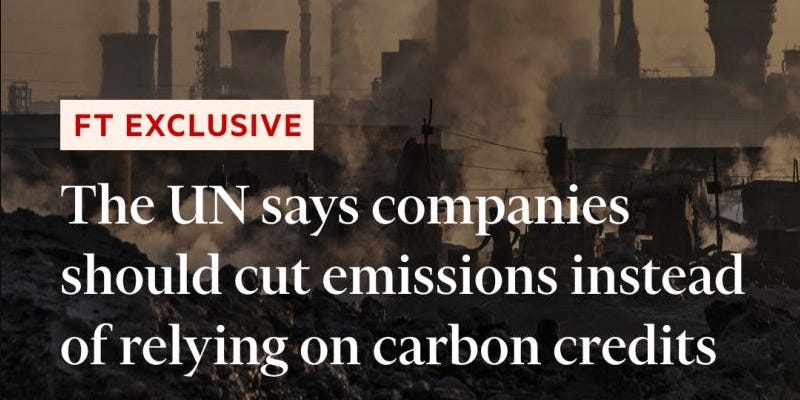Out of the frying pan and into the fire: The United Nations opposes voluntary carbon credits, while proposing carbon trading under Article 6 of the Paris Agreement
The Financial Times reports on a draft policy document from the UN that spells disaster.
A draft policy document from the United Nations pushes for companies to cut their emissions rather than buying carbon credits.
The Financial Times reported on the draft document earlier this week. The document was produced by the UN task force on global carbon markets, which is convened by the UN secretary-general’s climate action team.
The Financial Times reports that,
The UN believes companies should invest in ways to curb their own emissions rather than relying on the multimillion-dollar carbon trading market.
Big Polluters and carbon offsets
The Financial Times points out that many Big Polluters, including Chevron and ExxonMobil, as well as Big Tech corporations such as Microsoft and Apple have included carbon offsetting in their climate promises.
Shell and TotalEnergies would have been two more good examples of Big Polluters that are using carbon offsets to give the impression that they are taking action on the climate crisis, while in reality they are profiting from business as usual.
Which, after all, is the fundamental purpose of the multi-million dollar carbon trading industry — to distract from the urgent need to leave fossil fuels in the ground.
As if to reinforce this point, the Financial Times spoke to Jeff Swartz, vice-president at BP’s trading and shipping arm. Swartz is also a board member of the Integrity Council for the Voluntary Carbon Market.
Obviously, Swartz makes no mention of the destruction that BP has caused, and continues to cause, by extracting and selling fossil fuels. Instead, he focusses on carbon finance — as if there is no other way of protecting ecosystems apart from selling carbon offsets to oil giants:
“I would hope and I would expect that serious organisations that are committed to protecting ecosystems . . . don’t shut down an avenue for channelling that carbon finance.”
In 2023, the total value of the global voluntary carbon market fell to US$900 million, down from US$1.4 billion in 2022, according to carbon market data company AlliedOffsets.
António Guterres on offsets at COP28
In November 2023, during COP28 in the United Arab Emirates, UN secretary-general António Guterres gave a speech in which he said that,
“Businesses, investors, cities and regions need to help lead the shift away from fossil fuels to renewables.
“I call on them to present net-zero commitments and accompanying transition plans fully aligned with the recommendations of my High-Level Expert Group on Net Zero that was created one year ago.
“This includes genuine decarbonization with detailed targets for 2025, 2030 and 2035.
“And avoiding dubious offsets or carbon credits, in any scope of emissions.”
Guterres’ use of the phrase “dubious offsets” is both tautological (because all offsets and carbon credits are dubious) and a massive loophole because it allows proponents of carbon credits to argue in favour of oxymoronic “high quality” carbon credits.
Article 6 carbon trading will make the climate crisis worse
The Financial Times makes clear that the UN task force is not opposing all carbon credits in its draft document. The Financial Times reports that,
The UN draft document said: “Carbon credits used cannot be counted as their [polluters’] own emission reductions” when purchased in voluntary markets outside of government-regulated schemes in which companies can trade permits giving them the right to pollute.
So, while the UN draft document is correct to be critical of carbon credits on the voluntary carbon market, it is nevertheless in favour of “government-regulated” carbon markets. This must be a reference to the still on-going negotiations about the carbon trading mechanism under Article 6 of the Paris Agreement.
In 2023, Rainforest Foundation UK pointed out that trading the carbon stored in rainforests under Article 6 could make the climate crisis worse. Rainforest Foundation UK looked at Gabon’s proposal to sell 90 million carbon credits from its forests.
Rainforest Foundation UK concluded that Gabon’s carbon credits were based on “arbitrary” calculations:
Gabon claimed that it had stored 90.6 million more tons of carbon in its forests between 2010 and 2018 than would have been the case without policy decisions it took in the 2000s, such as banning the export of raw logs.
However, the figure of 90.6 million ‘extra’ tons has been created by first, reducing by an arbitrary 10% the amount claimed to have previously been stored in the forests, and then adding an extra arbitrary 10% to the actual amount of carbon stored during 2010-2018. Without these ‘adjustments’, which have no basis in science or UN policy, it appears that Gabon’s forests actually emitted an extra 16.5 million tons of carbon across the same period.
The UN is correct to criticise the disastrous voluntary carbon market. However, by promoting the “government-regulated” Article 6 carbon market the UN will make the climate crisis worse.





Chris, you wrote "“government-regulated” carbon markets. This must be a reference to the still on-going negotiations about the carbon trading mechanism under Article 6..." " When I read the FT piece I thought "government-regulated carbon markets" referred to cap-&-trade schemes, which might make sense since (in theory) these programs put an upper limit (cap) on emissions (unlike the UNFCCC). Are you sure this is not the case? I guess we'll see when the doc is released or leaked to critics.
Thank you, this article is almost manifesto level. All "carbon markets" are bullshit since there is no possibility that any existing part of Nature (except perhaps for the subduction of continents) could possibly offset millions of years of properly sequestered carbon being burned in only 200 years. There is no typeface large enough to write "Bullshit" in suitably. But remember, it is a demand-side issue, it is YOUR hand on the petrol pump that drives the search for more oil.